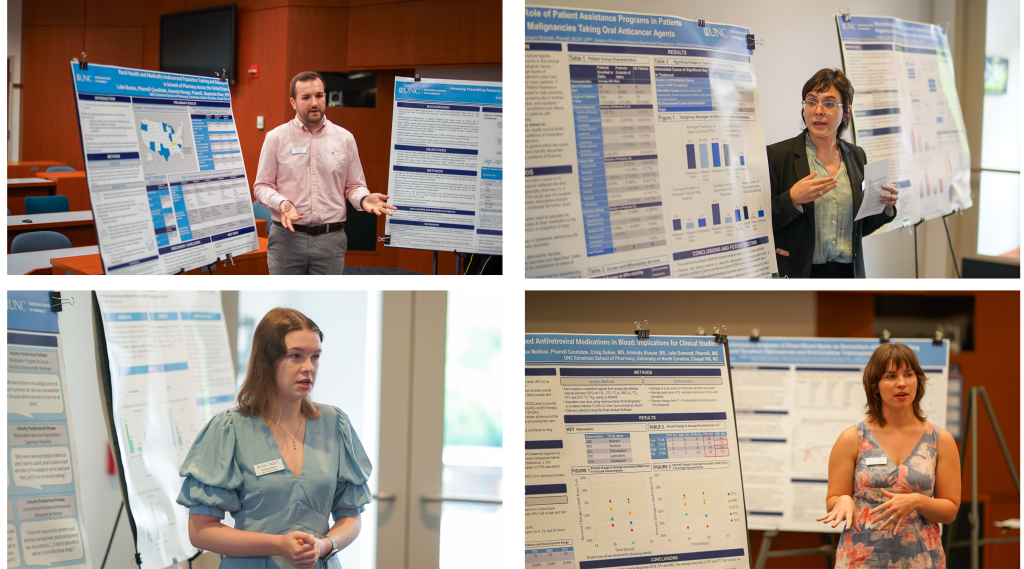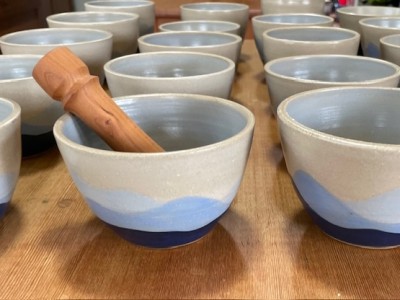April 18, 2024

Third year Pharm.D. students in the Research and Scholarship in Pharmacy (RASP) pathway presented their research findings to peers, faculty and staff members of the UNC Eshelman School of Pharmacy on April 17.
“The RASP poster session remains a highlight of our academic calendar, showcasing the remarkable achievements of our students within the RASP pathway,” said Kathryn Morbitzer, Pharm.D., RASP program director and associate professor in the Division of Practice Advancement and Clinical Education. “This celebratory event not only highlights the culmination of over a year of dedicated research and innovation, but also marks a pivotal moment for our students as they prepare to present their findings on larger stages and pursue publication opportunities. It’s a joy to witness their growth and success.”
RASP is a longitudinal, selective pathway within the Doctor of Pharmacy elective curriculum built around a mentored, in-depth, scholarly project. Each student frames an answerable question with a faculty mentor, generates and interprets relevant data and communicates their findings.
“My time in RASP has tremendously impacted my pharmacy school experience,” said Luke Burton, Pharm.D. candidate, Class of 2025. “I have not only learned the fundamentals of research and what it means to be a pharmacist who participates in research, but I have learned how to collaborate with others and effectively communicate those results to peers, colleagues and patients.”
Melissa Roverse, Pharm.D. candidate, Class of 2025, examined how the current system of assistance programs for blood cancer patients afford and maintain treatment on newer oral anticancer medications. “These medications have had a really profound impact on improving survival for many of these cancers, but due to their expense, a lot of patients rely on assistance programs to maintain consistent access to their medications,” she said. Her study will pilot methods to be used on a larger scale to answer whether these programs are doing enough and if current access to them is equitable.
Students in the RASP pathway enroll in three elective courses during their second and third year of pharmacy school where they learn about the research process, gain skills through self-directed learning and conduct research with the School’s world-class faculty.
“The RASP research experience gave me the opportunity to connect with faculty mentors to a much greater degree than I would have through other courses or extracurricular experiences,” said Emma Smits, Pharm.D. candidate, Class of 2025. Her research identified factors that influence the well-being of postdoctoral fellows in pharmacy programs and the findings will help inform the School’s initiatives to improve well-being among its community members.
The poster presentations simulate what students would experience at a professional meeting and serve as an opportunity for students to share their project results and develop their presentation skills. Most students continue with their project in their fourth year and, after successfully submitting their research thesis, graduate with honors at commencement.
“The knowledge and experience I have gained with RASP has truly helped me in all other aspects of my academic life,” said Margaux Meilhac, Pharm.D. candidate, Class of 2025. “I am more confident evaluating literature, writing scientific articles and optimizing experimental design. RASP is a unique opportunity for students, and I think everyone should consider seizing it.”
Latest News

Ph.D. student aims to make global impact through vaccine research



